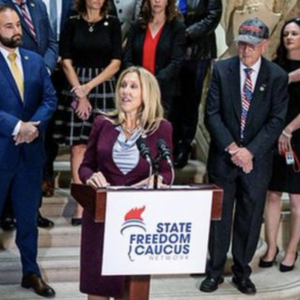Should taxpayer dollars pay for experimental drug treatment for children experiencing gender dysphoria? The 24-member Pennsylvania Freedom Caucus says no.
The legislators released a letter saying their members oppose state funding for health institutions that provide pediatric puberty blockers. They include the state-related university healthcare systems of Penn State, Temple University, and the University of Pittsburgh.
“This opposition comes on the heels of the discovery of a Penn State Health Children’s Hospital policy that would prescribe puberty blockers to children under the age of 10,” the lawmakers wrote.
That policy reads, “The clinic’s pediatric endocrinologist provides puberty-blocking medications, cares for people with differences of sexual development, and cares for patients who are young than 10 years old.”
Rep. Aaron Bernstine (R-Butler/Lawrence) sent a formal inquiry to all three healthcare systems on May 15 requesting data about pharmacological intervention and medical procedures of “gender-affirming care” provided to minors.
Penn State, Temple, and Pitt are state-related institutions and are listed to receive more than $882 million in the 2023-24 budget. They require two-thirds votes in the House and Senate for this funding.
“The Pennsylvania Freedom Caucus will not even consider a yes vote if policies that endanger the health and welfare of children remain unchanged,” said PAFC Chair Dawn Keefer (R-York). “To sit by and allow public funds to be used in experimental activities causing irreversible harm to children, some under the age of 10, makes lawmakers complicit in this abuse couched as health care.”
Rep. David Rowe (R-Snyder/Union/Juniata/Mifflin) said the two-thirds threshold for approval means “House Democrats will be unable to push through continued funding for non-preferred institutions with Republican support.”
“Our constituents can rest assured that the PA Freedom Caucus will lead the effort to unite Republicans in opposition to such funding as long as any policy remains in place that endangers the health and welfare of our most vulnerable and valuable demographic, our children,” Rowe said.
Keefer told DVJournal she was concerned about doctors providing puberty blockers to children “as young as 5 years old.”
She said experts testified about it to a House Health Committee subcommittee, which she serves on, so she knows what clinicians are doing in this field.
“Puberty blockers, hormone therapies, surgeries, chest surgeries, bottom surgeries were rarer in children,” said Keefer. “We had professionals coming to us and saying, ‘This is not a good practice; this is not a good standard of care. There are many adverse consequences to it…one being that your bones aren’t developing properly.’ So it’s poor structural development. With hormone therapy, that’s a huge issue. You’re messing with the (child’s) endocrine system, which is a whole other issue.
“So you take these kinds of irreversible actions on children as young as five years old, and that’s abuse,” said Keefer. “Somebody has to start raising a red flag here and saying, ‘You’ve got to step back from this.’”
“You know we wouldn’t do this with anything else,” Keefer said. “This is all experimental. These are off-label uses of drugs on children.”
And once someone has taken these steps, “they become patients for life,” said Keefer. “They’re on a whole cocktail of therapies they have to remain on, and they have, again, skeletal issues, muscular issues, infection issues. It runs the gamut. When you stop the hormone therapies, their body will go back (to the opposite gender).”
There are also social and psychological challenges.
“How do you tell a 10-year-old child you’re helping transition that they will never be able to have an orgasm? How do they even know what that is? How can they know or appreciate it?
“It’s one thing to provide psychological care for individuals that are dealing with gender dysphoria, but when you start taking these drugs and having surgeries, I think it’s a line too far.”
DVJournal previously reported on activists who have undergone transgender treatment and are now speaking out against allowing it for children. Chloe Cole, who is suing the doctors and hospital that treated her, said she began transitioning at age 13 and had her breasts removed at 15. She realized a year later that she had made a dreadful mistake and now lives as a woman.
Recently, author Gerald Posner wrote in The Wall Street Journal that Finland, Sweden, and Norway, which pioneered the use of puberty blockers for children, are now cutting back on the practice because of long-term side effects.
Penn State shared this defense of its medical care: “Penn State Health provides appropriate and proven care for a wide range of pediatric medical conditions, and none of the funds appropriated to Penn State University flow to Penn State Health clinical activities.
“Penn State Health does not use puberty blockers in children under 10 years of age with gender dysphoria. Penn State Health adheres to the international guidelines that do not support irreversible changes to children as it relates to gender dysphoria care, and there are no plans to change this position.
“Puberty-blocking medications (gonadotrophin-releasing hormone agonists (GnRHA)) have been in use for more than four decades to treat a wide array of medical conditions. In pediatrics, the effects of these medications are fully reversible and are commonly used with children under age 10 to treat premature puberty (medically termed precocious puberty). The medications are used to delay puberty until the child reaches an appropriate age for puberty to begin. In these cases, puberty-blocking medications are the widely accepted standard of care.”
Neither Temple nor Pitt responded when asked for comment.
Please follow DVJournal on social media: Twitter@DVJournal or Facebook.com/DelawareValleyJournal

